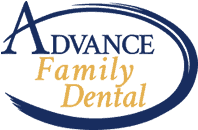
Don’t Let TMD Control Your Life
If you’ve been dealing with persistent jaw pain, frequent headaches, or difficulty chewing, you might be suffering from a temporomandibular joint disorder, commonly known as TMD. Many people aren’t aware that these symptoms can be connected to the jaw joint, and they may spend months or even years searching for relief without realizing that TMJ treatment could be the solution they need. At Advance Family Dental, we understand how frustrating and disruptive these symptoms can be, and we’re here to help patients in Vadnais Heights find lasting relief.
Understanding TMJ and TMD
The temporomandibular joint (TMJ) is the hinge that connects your jaw to your skull, allowing you to open and close your mouth, chew, speak, and yawn. When this joint becomes inflamed, misaligned, or damaged, it can lead to TMD, which encompasses a range of disorders affecting the jaw joint and surrounding muscles. TMD can develop from a variety of causes, including teeth grinding, jaw clenching, arthritis, injury, or even stress. The symptoms can vary widely from person to person, making it important to seek professional evaluation if you suspect you might be affected.
Common Signs You Might Need TMJ Treatment
Many people live with TMD symptoms without realizing there’s a treatable cause behind their discomfort. Here are some of the most common signs that TMJ treatment might help you:
Jaw Pain or Tenderness: One of the most obvious signs of TMD is pain or tenderness in the jaw joint area, especially when chewing or speaking. This discomfort may be constant or come and go throughout the day.
- Chronic Headaches: TMD often causes tension headaches or migraines, particularly in the temples or behind the eyes. These headaches can be persistent and difficult to manage with over-the-counter pain relievers alone.
- Clicking or Popping Sounds: If you hear clicking, popping, or grating sounds when you open or close your mouth, it could indicate a problem with your jaw joint. While these sounds aren’t always painful, they can be a warning sign of TMD.
- Difficulty Chewing: Trouble chewing or a feeling that your upper and lower teeth don’t fit together properly can be related to TMD. You might also experience muscle fatigue when eating or feel like your jaw is “stuck” in an open or closed position.
- Ear Pain or Ringing: Because the TMJ is located close to the ear canal, TMD can cause earaches, a feeling of fullness in the ears, or even ringing in the ears (tinnitus). Many people initially assume these symptoms are related to an ear infection rather than a jaw problem.
- Neck and Shoulder Pain: The muscles that control jaw movement are connected to the neck and shoulders. When the TMJ is not functioning properly, it can cause referred pain in these areas, leading to stiffness and discomfort.
If any of these symptoms sound familiar, it may be time to search for a “dentist near me” who can evaluate your jaw joint and recommend appropriate TMJ treatment.
How TMJ Treatment Can Help
The good news is that many cases of TMD can be successfully managed with conservative, non-invasive treatments. At Advance Family Dental, Dr. Zollinger has extensive experience in diagnosing and treating TMD, and he works with each patient to develop a personalized treatment plan based on their specific needs and symptoms. TMJ treatment options may include:
- Custom Oral Appliances: One of the most effective treatments for TMD is a custom-fitted oral appliance or night guard. These devices are worn while you sleep to prevent teeth grinding and clenching, reduce pressure on the jaw joint, and promote proper alignment.
- Physical Therapy and Exercises: Gentle jaw exercises and stretches can help strengthen the muscles around the TMJ, improve flexibility, and reduce pain. Your dentist can guide you through these techniques or refer you to a physical therapist if needed.
- Lifestyle Modifications: Simple changes like avoiding hard or chewy foods, practicing stress-reduction techniques, and being mindful of jaw habits (like resting your chin on your hand) can make a significant difference in managing TMD symptoms.
- Medications: In some cases, anti-inflammatory medications or muscle relaxants may be recommended to help reduce pain and inflammation in the jaw joint.
- Orthodontic Treatment: If misaligned teeth or bite issues are contributing to your TMD, orthodontic treatment such as braces or clear aligners may be part of your long-term solution.
Don’t Let TMD Control Your Life
Living with chronic jaw pain and related symptoms doesn’t have to be your reality. If you’ve been searching for a “dentist near me” who understands TMD and can provide effective TMJ treatment, Advance Family Dental is here to help. We take a comprehensive approach to diagnosing and treating jaw joint disorders, and we’re committed to helping you find relief so you can get back to enjoying your daily activities without pain.
Contact Advance Family Dental today to schedule a consultation and learn more about how TMJ treatment can improve your quality of life. Let us help you take the first step toward a pain-free smile.
